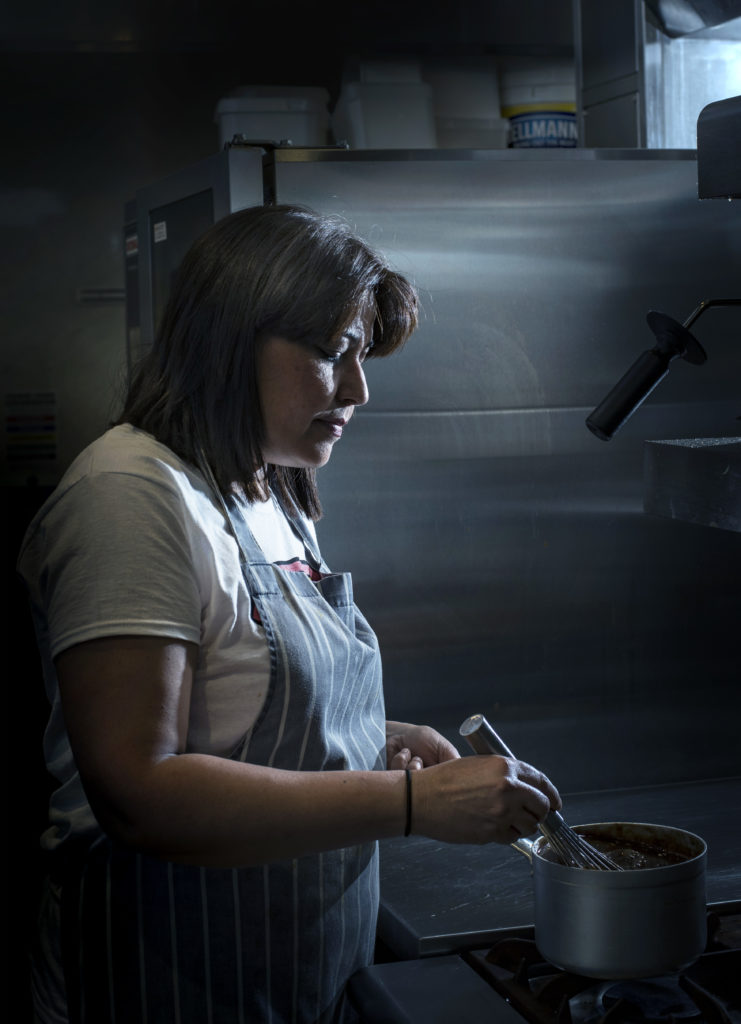Romy is a British/Indian chef, food writer, author and broadcaster. She was the owner and head chef at Romy’s Kitchen. In 2016 she was appointed an MBE in the Queen’s 90th birthday honours list. Romy is now one of the chefs on the new series of Ready Steady Cook on BBC One. She is a regular on Steph’s Packed Lunch, BBC The One show, BBC Country Life, BBC Celebrity MasterChef, The Hairy Bikers’ Comfort Food, James Martin’s Saturday Morning, Sunday Brunch, and much more. Romy is also a regular on BBC Radio 4’s Food Programme. She is the author of ZAIKA – Vegan Recipes From India, and regularly contributes to The Sunday Times and Telegraph and international publications, including The New York Times. Romy was invited to speak at the Mad Symposium in 2018 and recently was invited to cook at the prestigious James Beard Foundation in New York. Romy is writing her next book The Himalayan Trail – Kashmir To Leh, out spring of this year. Romy finished filming a small series of films with BBC Food with seasonal vegetables.
Raj Girn: Welcome to The ANOKHI UNCENSORED Show folks, I’m thrilled to have Romy Gill, celebrity chef on the show today. Rosie is a force to be reckoned with, staying true to her cultural upbringing and advocating for South Asian cuisine in the UK’s mainstream. Her appearances have include and continue to be Ready Steady Cook, Steph’s Packed Lunch, BBC Radio 4’s Food Programme, The Sunday Times, Telegraph and “BBC Food”. Romy is also a TEDx speaker and has been awarded with the MBE, a member of the Order of the British Empire, for her community work. I’m pleased to announce that she is one of our valued recipients of The ANOKHI ADVOCATE List 2021 in commemoration of the 19th anniversary of the ANOKHI brand. Congratulations for making the list this year, Romy and I welcome you to this special edition of The ANOKHI UNCENSORED Show.
Romy Gill: Thank you for having me, I’m so excited to be able to join you guys and be on the show and really honoured honestly to be part of your awards, and I think it’s really encouraging for women of colour, women of certain age and younger generation. You want to be in the hospitality industry. I think it’s really important for them to be able to see this and be part of this.
Raj: Absolutely. So, Romy, I want to begin by asking you, what is your personal advocacy philosophy? Can you share that a little bit?
Romy: So my motto has always been that I am an immigrant or you can say my parents, they’re migrants from Punjab to West Bengal. So I came here in the UK. My daughters are first generation. So when you kind of move from a different country, you take your language, you take the food you grew up eating. And and of course, we, no matter how much, I’m always going to be of women of colour. So you have to understand that I would have to work maybe harder. 99 per cent harder. One per cent luck. For me, the working hard part has always been my motto. And also, finding a mentor is really, really important in hospitality or acting or anything which you want to do. Finding the right mentor who can guide you, who can help you when you are in dark places. Or, [if] you’re in a good place you can help people. I think that has been my philosophy. My philosophy has always been never, never be afraid of asking people. People are going to say either yes or no. So if I didn’t have a godmother in the industry, in order to to be able to get people to recognize me or eat my food, maybe for me it was very important that people first eat my food and then understand what who am I and everything? I think food speaks. Food is a language that connects people. You share your food, your culture, people warm up to you. I think that has always been my philosophy that, you have to work hard? I have never been lucky that somebody has come over to me and said, ‘oh, you, you really could get this’, but I can work hard. Each boss and a mentor is really important.
Raj: I absolutely love that answer. So I want to ask you this, Romy, how does what you believe in translate over into your professional role as a celebrity chef who specializes specifically, as you mentioned in Indian cuisine?
Romy: I am very, very grateful to my parents. Sadly, my mom’s no more. She passed away a few years ago, but I believe that my dad was very young when he moved from Punjab to another state of India in this very big country. We speak different languages, we look different. We have different rituals, different cultures, different ways and techniques of cooking food. So Indian food is not just Indian. So I was very, very lucky that my dad worked in a steel plant .I was born there. I grew up there. So how understanding of Indian food in a very different way to many Indian chefs or Southeast Asian chefs who are from different parts of India. But I think because of my my foundation was so good. I spoke five Indian languages fluently, but I had an understanding of Punjabi food and how mom would cook Bengali food with my friends and Kerala, Rajasthan, a Kashmiri food. I think that kind of a really evolved when I came over here, I opened a restaurant and became a self-taught chef. I think that for me, I stayed very much true to my roots in a way that the food that I used to eat with my friends. My influences are very much from street food because street food is so delicious and it’s cooked in front of you. So I took that ethos and my mom and dad and I kind of did that. But I also call myself a British Indian chef because I have come from one homeland to this, this is my homeland. I call myself a British Indian chef. I use the produce of this country, but I get my back to your roots and how I grew up eating. So I also am very creative. You have to be creative as a chef. You’re still learning, you still you can’t say, ‘I’m a chef. I know everything’. I travel. I’m a travel and food writer, so I travel to different parts of India. I live in the shoes of those people. I cook the food with them, I eat the food with them. Then I tell a story about these people. I think you have to do that as a chef. If you travel within that country, learn from that country about the region of food, I think for me, I think Indian food is not Indian is so wide and we have I have so much to learn still.
Raj: Yeah, absolutely. And I think that’s the key here is always being the student to your craft. And so I want to ask you this why is advocating for Indian cuisine so important to you?
Romy: It’s really important to me because I am Indian and I come from a culture where food is the main focus of everything. So I kind of took that from it. We have curry houses in the UK, which actually I have a lot of respect for them because if these curry houses did not introduce the British people to the Indian food or so-called curry Indian food, I wouldn’t be here today. We would have taken us a long time. So I have respect. That doesn’t mean that I’m going to eat that food. I teach people that Indian food is Punjabi food. That’s Bihari food, that’s Bengali to the south. You know, even if you go to South India, you can just say South Indian food, this Kerala food that would from Andhra Pradesh or any food is so, so different. So my next book I’m writing [On the Himalayan Trail: Recipes and Stories from Kashmir to Leh] which I’m writing is so different. So me teaching people and because of its travel now they understand that Indian food is just not Indian, it’s very regional and we speak so many different languages. I don’t go on social media and fight about a cultural appropriation because for me, I can cook a decent toast and put some chilies in it, and that’s how I would do it. That doesn’t mean I’m upsetting somebody. At my restaurant. I had all people from different cultures cooking Indian food. If somebody wants to cook Indian food, I always say to people, have the respect of that person, have the respect of the country and respect the food. So why can’t we all cook the food? Food is something to share. To cook. Food is a joyous, it’s very happy for me. It’s it’s very joyous moment when I cook in the kitchen. I have my days, but it’s a very joyous thing for me. It’s something which brings me happiness.
Raj: Absolutely. And I think that’s key here in what you just shared with us, Romy is that when people think of Indian cuisine, they think it’s all one type of cuisine. And I think that specific advocacy that the journey that you run with this particular cookbook that you’re also launching with all of what you’ve done so far, has been to shine a light on just the diversity of what Indian cuisine means. And I think that really is a key takeaway from our discussion today. I want to ask you this: what challenges have you had to overcome when voicing your support to getting out the right message for your advocacy in, you know, the diversity of what Indian cuisine is and what have some of those you know been for you?

Romy: I think for me, the challenge is firstly, was when I wanted to open a restaurant. I started my business from my home. I wanted to be around my daughters. But the thing I found when opening a restaurant, a) I was a woman and a woman who’s never opened a restaurant. Someone who has worked in the industry but never open her restaurant. And the thirdly was Indian, you know, as a woman of colour. So I think those factors big banks didn’t give me loan. That was the problem. And then anybody in their right mind would have given up because the building, which I took over took me three and a half years to open because it’s a grade two listed building. It was very old. So there were so many things. Eventually, when I opened the restaurant and everybody said, ‘you are bloody strong woman’ (laughs), I had to do it. My daughter was six months old when I was doing all these things, carrying her and doing other things. But I think when you believe in something, you have that journey, your passion. You want to do that not just the passion, but you have to believe in yourself. No one else will believe in you. If you don’t believe in yourself. It was really, really hard. Because back then, when you’re going through all of these things, your relationship with your husband, with your kids, everything kind of falls apart and because we are very strong, we spoke about it. But I think sometimes the relationships can go in different ways, you know?
But I just think that for me, it was very much that I was focused. I wanted to do this. And eventually when it happened, then I also sold my gold jewelry, which I had loads of gold jewelry as Indian folks which we do have, and my daughter would have never worn. So I sold a lot of that. I rang my parents and said, you’ve given me all this. I want to sell it. That’s said ‘that’s why we gave you so at the time of need when you want this’. So we put that in. I think for me, my journey was very, very different to other people. And then opening it up in a very, very small town. I am not in London. Everybody thought, this is a mom who has woken up and wants to open a restaurant. So my restaurant was my restaurant. I was the head chef. I opened it. Nothing to do with my husband. He helped me in the journey. Also I’m not waiting for anybody like some chef has to come from India. I just learned on the way. You learn all those things individually. But then I taught the youngsters, the people who were from this country. I think there were so many of this. Once I opened the restaurant there were none of the journalists, none of the PR, you know, a lot of people have never heard of me. So I said to my staff, ‘let’s take a break for a week’. I need to go to London. I need to do this. Pop-Up Carousel have asked me, actually, honestly, they changed my life. Carousel made me a pop up there and each journalist, all the chefs came and supported me and ate my food. That’s how they started to know about me. I always tell my daughters, you have to take a step forward. A challenge. It does come here like you go in your dark corners, you have to do it. So I think I faced so many challenges, but I think I proved that I can cook. I work 16 hours, Raj. I work 16 hours for seven years I didn’t see my daughters for such a long time, and that’s the part that I missed. I wanted to cook and not just stand there and say, that’s it, I’ve opened it. I don’t want in be the front of the house that wasn’t me. I wanted to be the chef. I wanted to cook food for the people, and I wanted to teach people that food is so diverse in India. Like you said, bringing challenges are part of life, you know, right? You can’t be you if you don’t have challenges.
Raj: Absolutely. And it’s it’s what helps us grow into who we’re meant to be, right? Absolutely. Romy, why do you personally believe it’s so important for people to incorporate a sense of advocacy into their lives on some level? I mean, some people, it’s a professional scenario. Others, it’s personal. Yet others is spiritual. And sometimes it’s kind of a combination of all of these. Can you share your thoughts on that?
Romy: For me, I think when you are in a profession of any kind, especially as a woman, you know, well, for me, it’s always been my grandma and my mom. They all cooked, they didn’t get the recognition, as parents cook all the time.I I’m cooking in the restaurant. I used to come home and think what my daughters will have. But you know, my husband can do this. He’s very, very good at cooking. But I think as a woman, you come home and you do certain things for your family and you think it’s really important that people in any kind of sector, there are so many unsung heroes. We need to talk about those unsung heroes in my culture, in my a Punjabi [culture]. I always taught selflessness. You know, you have to be kind. These are really important factors. But at the same time, I think it’s really important to recognize anybody in any kind of part of of the profession. So for me, I think it’s really important to recognize them and acknowledge that. Then it gives you a sense that somebody does care about what you’re doing. Somebody is out there who’s looking and it’s really important for the younger generation for me. You know, when I’m gone, I want somebody like for example, Madhur Jaffrey who completely changed up for where I am on TV today, or on radio or whatever I’m doing, because she opened those doors for us, right? She opened its doors in ’80s when when we wouldn’t have talked about it, I think, and then look at how she’s still amazing. And then [with] the younger generation, what I’ve done, you know, coming from a small town, never in a million years would have thought I would get an MBE, and I didn’t even know what an MBE was. And I rang those people into the office three times, ‘is it for me? Are you sure it’s for me?’ I think the recognition is really important and teaching the younger generation that, yes, there will be downfalls, yes, that of the upliftment, but there will always be somebody to be there for you. But that’s why I think it’s really important.
Raj: You recently did a TED talk on the theme The Power of Choice. Can you share your thoughts around your belief system when it comes to identity?
Romy: I think The Power Of Choice, was such a brilliant subject for me when they asked me to do that. I think it was really important because my journey has been so different from anybody’s journey, but it’s a journey of hope. It’s a journey of ups and downs, but it’s all mostly about it. So I think [it’s the] power within you. You know, last year with the pandemic, such things happened, which was for good. I used to raise a lot of money. But at home, we raised over £10000 for different charities. For me, one of the power of choice is that in the pandemic, domestic violence was huge. So for me, that was really important as a women that kind of going through what’s happening and people look, if we could help them, for my journey, it’s been something that I think is really, really important that when you have a power, then you have a choice. When you have that power, you can then then be able to help others, you know? For me, my journey was coming from a small town, coming here, starting from scratch. Do you come from a culture which is very different? I came here, I had to make my own friends. I had to make new friends, new people and learning the language. I went to English Medium School, but you know, the way of speaking the way of everything is so different. Our clients are different. So I think I have to start back from scratch. And that for me, last year taught me that if I had that power and in that power my journey, how could I help somebody? For me, that was very important that I’ve kept to to to do that, and I don’t see it on any social media and say, I’ve raised this much money or I’ve done that. For me, it’s really important that I focus on what I do, and if I have that power, how can I help? So for me, that was the talk I wanted to share with and especially with the women who come with the TED talk. It was at a women’s college and how women, you know, if you’re in college, you don’t know what you’re going to do when you’re doing in school or in college, because in India, we don’t have that information like in western countries. We have so much scope of other things. But when you are in a rural village or town, they don’t have that much opportunities. So I think for me, giving that talk to these women and encouraging them that, yes, it’s education is so important for women because yes, you can get married and something can happen to you. But education will always stay and it can work. And no matter, no job is big or small, no matter if we can earn money, you know you have education, you can earn money. I think that’s why I wanted to talk to the women.
For me it was really important to get out and be surrounded by people who were positive, who were not saying ‘oh no, you shouldn’t do this, you shouldn’t do that’…I’m surrounded [by] people that really uplifted me, I say that’s what you need to do.
Raj: Education is power. Education is empowerment, right? Yes, absolutely. So with all that you’ve seen and experienced as a South Asian woman carving out your narrative, what advice would you give to everyone watching, listening and reading this who want to be more proactive in a cause that they believe in to actually get up and action it, no matter the challenge that comes with it, because it’s always the perceived challenge that stops us from accessing our destiny rather than being a victim to it. What are your thoughts around that? Because challenges are always going to be there in life. It’s a part of what we do. How do we speak to people who have some sort of a passion or a belief system in something to actually get up and get it done?
Romy: I think what I found there, there’s so much negativity inside us as well that I’ve been looking at people. We always try to blame people that such and such things will happen or this happened to me. And if I’m doing well, that person is jealous of me. I think negativity is within us all. And if you can let that negativity get out of your body and believe in yourself, it’s very easy to say because my path was very difficult, very emotionally difficult, but very satisfied. So I think for me, it was really important to get out and be surrounded with people who were positive who were not saying, ‘oh no, you shouldn’t do this, you shouldn’t do that’. I think for me, I surrounded myself around the positive people I surrounded with people that really uplifted me, I say, that’s what you need to do.
Raj: You know so much that you’ve shared. I hope it will give, the younger generation some hope. I hope it will allow people to realize that, at the end of the day, no one’s really going to make what you need happen if you’re not there every step of the way, just kind of actioning and doing the work because we get what we, you know, what we put in to life. You know, and I just I really want to thank you for sharing your perspectives with our global audience today, Romy. And again, congratulations to being one of our valued honorees on The ANOKHI ADVOCATE List. I really appreciate your insights, your perspectives. You really are a role model for today’s and tomorrow’s women of colour and women who want to just get up and find a way to do it all. And I feel that you’ve done that. You’re a mother, a wife, you are a community leader and you are really pushing forward your advocacy and your belief in getting Indian cuisine known and experienced and understood in the in the big wide world. Thank you so much for your time.
Romy: Thank you. I hope I will come to Canada with my next book tour and hopefully meet you guys.
Raj: Oh, definitely it’s going to happen if you come here. We are meeting. Absolutely. Thank you so much.



